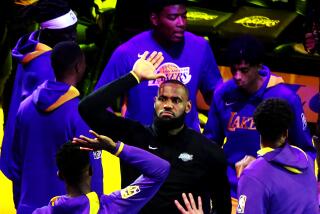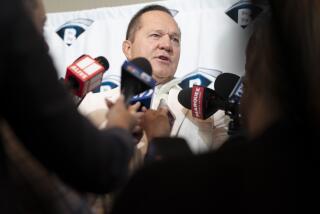NHL Deals in Uncertainty
There are 79 days left until the NHL possibly goes dark. Seventy-nine days of never-going-to-budge rhetoric from both sides of the collective bargaining negotiations, or rather the non-negotiations.
Thatâs more than two months of hearing about âcost certaintyâ and a âmarket-based system.â
Yet, with all those turgid days to plod through, the beginning of what could be a long destructive, lockout has already started. An off-season unlike none other has descended on the NHL.
The free-agency period begins Thursday, with more players likely to be available than ever before, as teams look to cut money, already observing the salary cap the owners crave.
Under the current collective bargaining agreement, teams must give unrestricted free agents qualifying offers by midnight Wednesday or else they became unrestricted free agents. More than half of the current NHL players could be available.
General managers have taken a hard look, if not a hard line, judging a playerâs value on the ice against the weight of his contract on the budget.
Already, many teams have begun streamlining for the possible work stoppage by shedding staff to reduce the overhead. Why have ticket sellers and marketing staff if there are no tickets to sell or games to market? General managers must proceed as if there will be a season, yet prepare for the lockout and the possibility of a salary cap.
âI really expect a very significant change in the way people conduct themselves in preparation for July 1 than in past years,â Mighty Duck General Manager Al Coates said. âWith the uncertainty, I think teams will attempt to protect what they consider good assets. But [general managers] may walk around the block a few times, come back to the office and take a more objective view.â
The collective bargaining agreement expires Sept. 15, but the summer will be played out under the current terms. That requires teams to make qualifying offers to their restricted free agents, give 10% raises to those who made less than the league average and match the previous contracts to those who were above the average.
Negotiations between the NHL and the NHL Players Assn. have been stalled since last fall. Commissioner Gary Bettman insists on âcost certaintyâ and a âcircuit breaker,â which union leaders say are euphemisms for a salary cap, which they adamantly oppose.
Neither side seems willing to move, or so goes the saber rattling.
âIâm impressed with the ownersâ unity,â Dallas owner Tom Hicks said in the Dallas Morning News.
After a meeting of players and NHL Players Assn. officials this month, Vancouverâs Trevor Linden said, âThe players are prepared to talk about a market-based system. Thatâs what weâre committed to. I think, definitely, guys are very adamant about what we believe in.â
Meanwhile, people less equipped financially are being put out of work.
Phoenix laid off 16 staff members, Carolina 15, Dallas 12, Nashville 11. The Mighty Ducks cut six positions, in what team officials called a reorganization of the teamâs business side. Toronto, one of the NHLâs most profitable teams, has announced a 33% cut in the salaries of 25 employees.
âA lot more people than just the players are affected by something like this,â Carolina President and General Manager Jim Rutherford told reporters last month. âIt affects owners, fans and of course, employees. It could be a tough off-season in that respect.â
The specter of a cap -- league officials reportedly want one of about $35 million -- will lead teams to trim their rosters, one team official said, adding that some players would not be given qualifying offers.
There are 756 NHL players, and 455 will need new contracts this summer, according to a study by the Hockey News. Of those, 303 are restricted free agents, who become unrestricted if they do not receive a qualifying offer.
A few contracts have been negotiated in recent weeks. Philadelphia center Keith Primeau, coming off an exceptional performance in the Stanley Cup playoffs, signed a four-year deal for $17 million, which averages out to less per season than he made on his previous contract. In Detroit, Nicklas Lidstrom was given a two-year, $20-million contract extension in April.
âIf you have a guy who you think is going to play a big part in going forward, then you have to be prepared to have a contract that needs to fit under whatever system is in place,â Detroit General Manager Ken Holland said.
On the other hand, Holland said, âIf you want to keep a guy who needed to be qualified, but he just makes too much, you say, âHere is what weâre prepared to pay you.â Once you hit July 1, you take your chances.â
July 1 has nearly hit, and the pool of available players will be larger. How many will be signed remains to be seen.
âOwners and GMs will make the decision as if there will be a season,â agent Pat Brisson said. âThere will be chances to sign free agents at a better price than two seasons ago.â
According to the Hockey News, the Dallas Stars have committed $45.8 million to 14 players for next season, the most money by a team. The Pittsburgh Penguins rank at the bottom, with $6.4 million committed to seven players.
The Ducks have committed about $33 million to 13 players. The Kings are in better shape, with $24.3 million committed to 14 players.
Still, âFree agents will probably be looking for the dollars they got in prior years,â King General Manager Dave Taylor said. âSpeaking for our team, we donât have that kind of money. We expect the prices to come down, or hope they do.â
Those on the other side point out those prices dropped last summer, proving, they say, that the system can correct itself.
âI expect it will be business as usual,â agent Jay Grossman said. âThere will be players who are free agents, and there will be a marketplace for them.â
As the Sept. 15 deadline approaches, though, things must either heat up or shut down, depending on the labor negotiations.
âAnytime the CBA expires, there are uncertainties, whether you have an up market or down market,â Brisson said. âWe just donât know yet what kind of playground weâre on.
âThere is no sense in panicking. There is going to be hockey at some point, whether it is in September 2004 or 2005. It is too big of a business.â
*
(BEGIN TEXT OF INFOBOX)
NHL Calendar
* Thursday: Free-agency signing period begins.
* July 15: Deadline for eligible Group II players to elect salary arbitration; deadline for eligible players to elect Group V free agency.
* Aug. 1-15: Salary arbitration hearings.
* Sept. 15: Collective bargaining agreement between NHL and playersâ association expires.
*
Leaving Town?
Mighty Ducks and Kings who will become free agents Thursday (group in parentheses):
*--* MIGHTY DUCKS KINGS Dan Bylsma (III) Jaroslav Modry (III) Garrett Burnett (VI) Bryan Muir (III) Casey Hankinson (VI) Zigmund Palffy (III) Mike Mottau (VI) Stephane Quintal (III) Cam Severson (VI) Jozef Stumpel (III) Nick Smith (VI) Scott Barney (VI) Keith Aucoin (II) Chris Schmidt (VI) Ilya Bryzgalov (II) Richard Seeley (VI) Kurtis Foster (II) Jerred Smithson (VI) Brian Gornick (II) Jason Allison (II) Mikael Holmqvist (II) Sean Avery (II) Jason Krog (II) Eric Belanger (II) Rob Niedermayer (II) Anson Carter (II) Ruslan Salei (II) Brad Chartrand (II) Petr Schastlivy (II) Mathieu Chouinard (II) Jan Tabacek (II) Joe Corvo (II) Vitali Vishnevski (II) Jeff Cowan (II) Adam Deadmarsh (II) Ryan Flinn (II) Ian Laperriere (II) Joe Rullier (II) Lubomir Visnovsky (II)
*--*
Classification for free agents: Group II (restricted; original team has right to match or accept draft-pick compensation); Group III (unrestricted; original team has no right to match); Group IV (restricted; players who have never signed a contract and are considered defected players); Group V (unrestricted; a player who has played in 11 professional games in each of the last 10 years, and makes less than the average salary of $1.726 million can declare for unrestricted free agency once in his career); Group VI (unrestricted; a player who is 25 years or older, has completed three or more professional seasons and in the case of a player other than a goaltender has played fewer than 80 NHL games, or in the case of a goaltender has played fewer than 28 NHL games).
More to Read
Go beyond the scoreboard
Get the latest on L.A.'s teams in the daily Sports Report newsletter.
You may occasionally receive promotional content from the Los Angeles Times.







